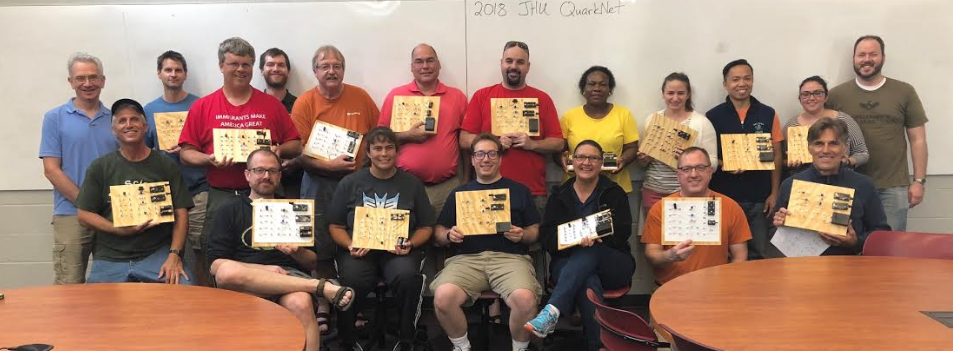
Spotlight on the Johns Hopkins University QuarkNet Center
In popular culture, Johns Hopkins University is mostly associated with medicine. Of course, it is also a top-level university; JHU has a great physics department with a robust particle physics group and is home to the NASA Space Telescope Science Institute. It is also a very active QuarkNet center going on its 18th year. JHU is a fixture in International Masterclasses and usually has a rather large number of students in attendance from around the Baltimore area. The mentor, Morris Swartz, is a QuarkNet PI and the lead teachers, Jeremy Smith and Kevin Martz, are QuarkNet fellows; Jeremy is also a consultant to QuarkNet and leads the Data Camp team. Last summer, their workshop included LIGO, particle physics, and astrophysics. Another feature was building circuit boards for student use. (The JHU group was recently awarded a Bauder Fund grant to make class sets of the boards.) They had a pretty special guest speaker too: Nima Arkani-Hamed, one of the theorists featured in Particle Fever.

JHU QuarkNet teachers with their circuit board prototypes..

News from QuarkNet Central
Mentors, if you have not yet filled out the 2019 RFP form, please do so ASAP by going to the text of this e-mail. If you have questions or need assistance, please contact Ken or Shane.
Teachers, you may now submit your proposal for the 2019 Beamline for Schools (BL4S) competition at CERN. Note that the deadline for submitting this year's proposal is March 31.
Orientations and updates for International Masterclasses (IMC) have begun, so sign up as soon as you can. Institutes doing MINERvA masterclasses especially need orientations, since it is a new measurement. Register via Google form. Still want to sign up for IMC? It is late but still possible. Contact Ken and he can help you through the process.
Data is now assigned for all registered IMC groups (though it can be adjusted). To find out more, take a look at the latest IMC circular.

Physics Experiment Roundup
CERN is proposing a new 100 TeV acclerator that, if built, will dwarf the LHC. Read about this Future Circular Collider (FCC) in Physics Today. And why big, energetic colliders? One reason might be to explore dark matter, according to symmetry.

Resources
The World Wide Web is 30 years old! Read about it in CERN Bulletin. There is a nice review in Forbes of matter-antimatter asymmetry and, on the wilder side, Physics Today reports on the notion of negative-energy particles which can extract energy from black holes.
IMC has been holding special masterclasses for the International Day of Wօmen and Gіrls in Science for the past few years, including this past Monday. Here are some impressions from schools in Villena and Valencia, Spain—in Spanish, of course.

Just for Fun
Is particle physics delicious? Yes, according to A Taste of Particle Physics in symmetry. But is it romantic? The Department of Energy suggests it may be with these amusing Physics Valentines.
QuarkNet Staff:
Mark Adams: adams@fnal.gov
Ken Cecire: kcecire@nd.edu
Shane Wood: swood5@nd.edu